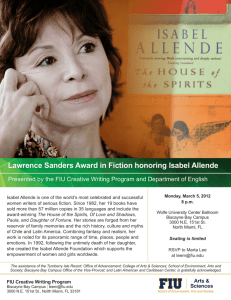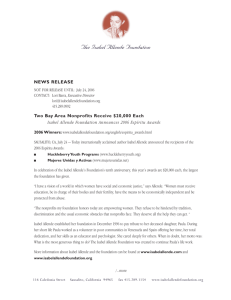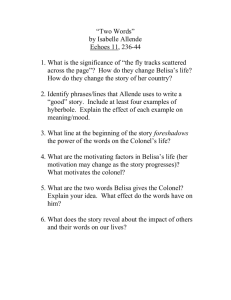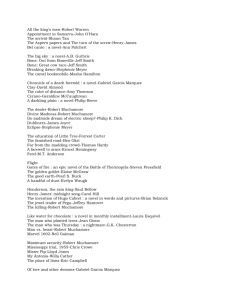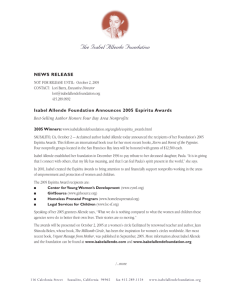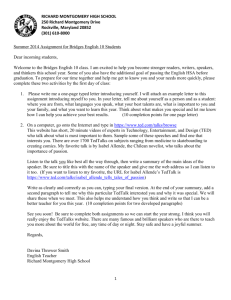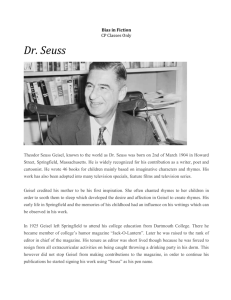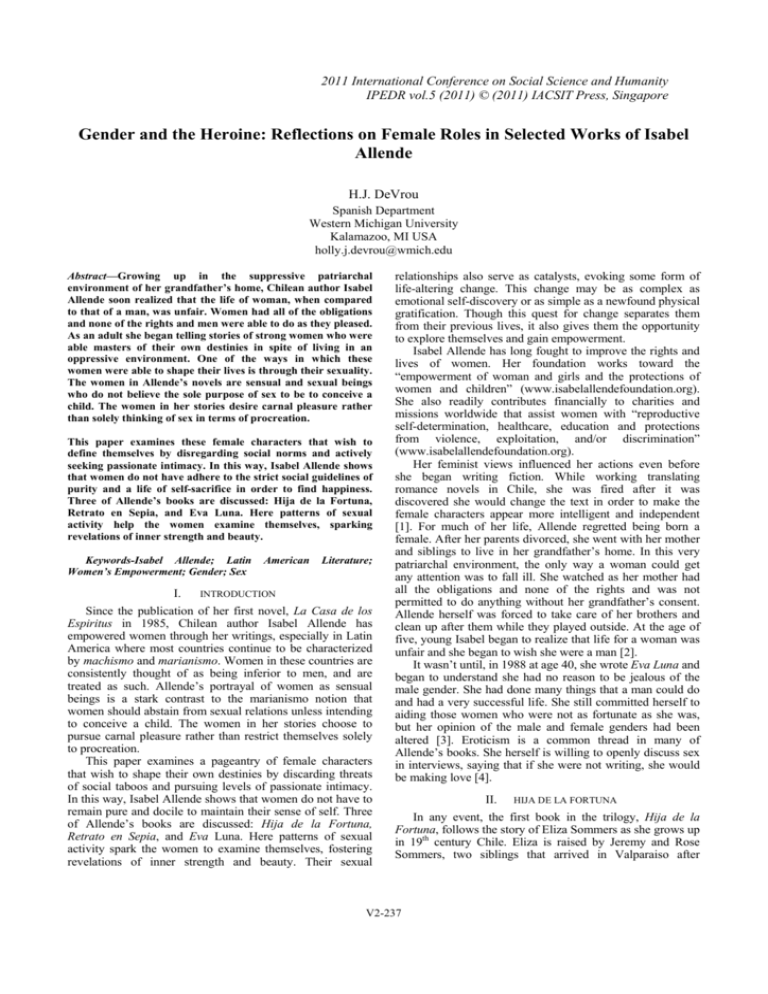
2011 International Conference on Social Science and Humanity
IPEDR vol.5 (2011) © (2011) IACSIT Press, Singapore
Gender and the Heroine: Reflections on Female Roles in Selected Works of Isabel
Allende
H.J. DeVrou
Spanish Department
Western Michigan University
Kalamazoo, MI USA
holly.j.devrou@wmich.edu
Abstract—Growing up in the suppressive patriarchal
environment of her grandfather’s home, Chilean author Isabel
Allende soon realized that the life of woman, when compared
to that of a man, was unfair. Women had all of the obligations
and none of the rights and men were able to do as they pleased.
As an adult she began telling stories of strong women who were
able masters of their own destinies in spite of living in an
oppressive environment. One of the ways in which these
women were able to shape their lives is through their sexuality.
The women in Allende’s novels are sensual and sexual beings
who do not believe the sole purpose of sex to be to conceive a
child. The women in her stories desire carnal pleasure rather
than solely thinking of sex in terms of procreation.
This paper examines these female characters that wish to
define themselves by disregarding social norms and actively
seeking passionate intimacy. In this way, Isabel Allende shows
that women do not have adhere to the strict social guidelines of
purity and a life of self-sacrifice in order to find happiness.
Three of Allende’s books are discussed: Hija de la Fortuna,
Retrato en Sepia, and Eva Luna. Here patterns of sexual
activity help the women examine themselves, sparking
revelations of inner strength and beauty.
Keywords-Isabel Allende; Latin
Women’s Empowerment; Gender; Sex
I.
American
Literature;
INTRODUCTION
Since the publication of her first novel, La Casa de los
Espiritus in 1985, Chilean author Isabel Allende has
empowered women through her writings, especially in Latin
America where most countries continue to be characterized
by machismo and marianismo. Women in these countries are
consistently thought of as being inferior to men, and are
treated as such. Allende’s portrayal of women as sensual
beings is a stark contrast to the marianismo notion that
women should abstain from sexual relations unless intending
to conceive a child. The women in her stories choose to
pursue carnal pleasure rather than restrict themselves solely
to procreation.
This paper examines a pageantry of female characters
that wish to shape their own destinies by discarding threats
of social taboos and pursuing levels of passionate intimacy.
In this way, Isabel Allende shows that women do not have to
remain pure and docile to maintain their sense of self. Three
of Allende’s books are discussed: Hija de la Fortuna,
Retrato en Sepia, and Eva Luna. Here patterns of sexual
activity spark the women to examine themselves, fostering
revelations of inner strength and beauty. Their sexual
relationships also serve as catalysts, evoking some form of
life-altering change. This change may be as complex as
emotional self-discovery or as simple as a newfound physical
gratification. Though this quest for change separates them
from their previous lives, it also gives them the opportunity
to explore themselves and gain empowerment.
Isabel Allende has long fought to improve the rights and
lives of women. Her foundation works toward the
“empowerment of woman and girls and the protections of
women and children” (www.isabelallendefoundation.org).
She also readily contributes financially to charities and
missions worldwide that assist women with “reproductive
self-determination, healthcare, education and protections
from violence, exploitation, and/or discrimination”
(www.isabelallendefoundation.org).
Her feminist views influenced her actions even before
she began writing fiction. While working translating
romance novels in Chile, she was fired after it was
discovered she would change the text in order to make the
female characters appear more intelligent and independent
[1]. For much of her life, Allende regretted being born a
female. After her parents divorced, she went with her mother
and siblings to live in her grandfather’s home. In this very
patriarchal environment, the only way a woman could get
any attention was to fall ill. She watched as her mother had
all the obligations and none of the rights and was not
permitted to do anything without her grandfather’s consent.
Allende herself was forced to take care of her brothers and
clean up after them while they played outside. At the age of
five, young Isabel began to realize that life for a woman was
unfair and she began to wish she were a man [2].
It wasn’t until, in 1988 at age 40, she wrote Eva Luna and
began to understand she had no reason to be jealous of the
male gender. She had done many things that a man could do
and had a very successful life. She still committed herself to
aiding those women who were not as fortunate as she was,
but her opinion of the male and female genders had been
altered [3]. Eroticism is a common thread in many of
Allende’s books. She herself is willing to openly discuss sex
in interviews, saying that if she were not writing, she would
be making love [4].
II.
HIJA DE LA FORTUNA
In any event, the first book in the trilogy, Hija de la
Fortuna, follows the story of Eliza Sommers as she grows up
in 19th century Chile. Eliza is raised by Jeremy and Rose
Sommers, two siblings that arrived in Valparaiso after
V2-237
leaving England and found Eliza on their doorstep. The
young Chilena is brought up in a suppressive environment
with Miss Rose attempting to make her in to a proper and
submissive young woman (and at times threatening to send
her to live in an orphanage run by Papist nuns). For his part,
Jeremy Sommers is very concerned with appearances and
says that the “destino de la mujer es preservar los valores
morales y la buena conducta [the destiny of a woman is to
preserve moral values and good conduct]” [5]. He will not
permit Eliza to do anything that does not adhere to these
strict guidelines. However, all of the “proper conduct and
morals” disappear when she encounters Joaquín Andieta,
Joaquín Andieta is employed by Jeremy Sommers at the
Compañía Británica de Importación y Exportación [British
Company of Import and Export] when they first meet. While
it takes him a second look to notice her, Eliza is head over
heels in love immediately. She remembers “cuando vio las
manos de largos dedos manchados de tinta de Joaquin
Andieta y oyó su voz profunda, pero también clara y fresca
como rumor de río…se sintió conmovida hasta los huesos y
un deseo tremendo de acercarse y olerlo la obligó a salir de
su escondite tras las palmas de un gran macetero [when she
saw the long ink-stained fingers of Joaquín Andieta’s hands
and heard his voice, which was deep but fresh and clear like
the sound of a river…she felt moved to her bones and a
tremendous desire to get close and smell him forced her out
of hiding behind a large potted palm] ” [6]. She is so
completely in love with Joaquin that it makes her physically
ill and she is confined to bed for quite some time. Miss Rose
is able to identify that her adopted daughter, Eliza, is in love
with Joaquin and she is very disturbed because it interferes
with her plans to find her a suitable husband of high social
standing. She tries to occupy all of the young girl’s time in
order to keep her from seeing Andieta, but her efforts are
futile. Eliza and Joaquin soon begin a physical relationship.
Allende is not afraid to be explicit with her description of
the sexual activity that occurs in her novels. When Eliza and
Joaquin have sex for the first time, the author describes them
discovering each other by “pusieron esto aquí y aquello allá
[they put this here and that there]” [7]. Here Eliza is able to
liberate herself from the constraints of her oppressive family
life. She separates herself from reality and sees herself only
in the moment with her lover. Nothing else exists for the two
of them; they are beyond fear and oppression. In this first
sexual experience, Eliza is able to begin her journey of selfdiscovery that takes her halfway around the world.
One of the consequences of such free and uninhibited
lovemaking is a child and soon Eliza finds herself pregnant
with Joaquin’s child. Not long before she discovers this fact
Joaquin leaves Chile to discover gold in California. Her
decision to follow him to the United States is primarily
motivated by a love of the man and a desire to have a family
with him. However, as her life progresses, we see that she
becomes less interested in finding her lover and more
interested in finding herself. She is able to do much more
than she would have been able to had she not spent those
Wednesday nights with Joaquin. While it can be argued that
had she not miscarried the child she was carrying on the boat
during her journey to California she would not have been as
free as she was otherwise; it can also be reasonably
speculated that had she remained in Chile, she would have
been restricted to the traditional roles of wife and mother. By
the same token, had she not left Valparaiso, she would not
have eventually married Tao Chi’en and had his children. In
the meantime, she traveled across much of the West
disguised as a man and experienced events she could never
have imagined back home.
III. RETRATO EN SEPIA
Allende’s second book in the del Valle trilogy follows
the story of Eliza in her later years, and that of her
granddaughter, Aurora. Retrato en Sepia takes place once
again in the United States and later Chile and predominately
focuses on Aurora. In this novel Isabel uses sex in a different,
though equally liberating way. Aurora falls in love with who
she believes to be the “perfect man.” Diego Dominguez was
the son of a wealthy known family that asks to dance with
Aurora at a celebration of the Chilean Independence Day.
Looking back, Aurora understands that he was never in love
with her, but being young and naïve, she willingly accepted
his marriage proposal soon after they met. The first night
they spent as husband and wife was a disaster according to
Aurora. The passion that she expected was notably lacking
and the physical pain of intercourse left her with a desire to
escape her marriage and return to the life she had had with
her grandmother. She complains that “para el hombre el sexo
era fácil – podía obtenerlo incluso a la fuerza – mientras que
nosotras era sin deleita y con graves consecuencias [for a
man sex was easy – he can even get it through force –
meanwhile for us it was without delight and with grave
consequences]” [8]. Though she was a virgin, she still
understood that lovemaking should be pleasurable for both
the man and woman. It was apparent that the encounter with
Diego was purely a mechanical sexual activity rather than
the passionate lovemaking that she had envisioned having
with her husband.
Aurora soon learns why the sexual relations with Diego
were not at all gratifying; he was already passionately
involved with a woman he loved, and only because of
spousal obligations did he engage in sexual relations with
Aurora. The fact that Diego was in love with his brother’s
wife, Susana, and became apparent the night Aurora found
her husband and sister-in-law making love in a horse stable.
She then realized that the passion and pleasure that the lovers
shared was something that she knew she would never
experience with her husband. The sterile, loveless sex act
that Aurora and Diego had was nothing compared to the
“amor voluptuosamente…sin prisa como si tuvieran el resto
de la vida por adelante [voluptuous love…slowly as if they
had the rest of their lives ahead]” [9]. She felt betrayed, lost
and afraid, because she knew that the marital vows she had
taken were meant to last forever, and her hope that
eventually she and Diego would grow to love each other
passionately was gone forever. Now she had a decision to
make. Should she stay in a loveless marriage because she
was bound to it by vows; or should she leave and suffer the
stigma of living as a “separated woman?” Her decision to
stay, out of obligation to Diego’s mother Elvira, is thwarted
V2-238
when her grandmother falls ill, and she decides to return to
Chile, where she remains after Eliza’s death.
Shortly thereafter, Aurora falls in love again, but this
time it is very different, as she embraces the depth of
passionate richness with her grandmother’s physician, Iván
Radovic. Perhaps because now she is able to be independent
and self-sufficient, she fully enjoys a relationship with a man
that is not tasked with being her sole means of support. This
is a consistent theme in Allende’s feminist literature:
suppression of feminine independence, intellectual
awakening, emancipation through “illicit love”, and lastly,
fulfillment. Regardless, the two lovers are able to
“separarnos por unos días y volvernos a juntar cuando nos
vence la nostalgia de los besos [separate ourselves for days
and come together when overcome by the nostalgia of
kisses]” [10]. A much stronger Aurora appears during this
period, and this certainly would not have happened had she
not experienced Diego’s betrayal, for this served as a catalyst
to her search for empowerment. She says that if Iván were to
betray her in the same manner as Diego, “no me consumiría
el llanto, como entonces, sino que lo mataría sin el menor
remordimiento [my cries would not consume me, as they did
then, but I would kill him without the slightest regret]” [11].
Aurora is able to pursue her passion – photography – without
the permission of her husband; yet she also is able to have
the fulfilling and loving relationship she desires, marked by
rich passionate and pleasurable lovemaking. Here Aurora
realizes she can have a profound and fervent relationship
with a man while still maintaining her independence and
self-identity.
IV.
EVA LUNA
Eva Luna came in to the world in a very disadvantageous
position. She was born the illegitimate daughter of a poor
woman who had been orphaned as a child and raised by
missionaries. Her father was an unknown indigenous man
that had once worked briefly as a gardener at the house
where her mother was a maid. At the age of six, when her
mother died, her godmother put her to work to earn a living.
After several years it appeared that the life of a maid is not
for her so she runs away. She meets a boy named Humberto
Naranjo who sees to it that she is cared for; he helps her find
a place to stay living with a woman who owns a brothel and
a transvestite living life as a woman. However after the
police raid the brothel, Eva is once again on her own.
As is common with many of Isabel Allende’s
protagonists, Eva experiences sex with different partners
before finding her true love. Her first such experience was
with Riad Halabí, the Turkish man she worked for as both a
maid and a store clerk. His wife had recently committed
suicide and though Eva was initially charged with her
murder, she was soon released from jail Riad knew that she
could not stay in his home. The night before she left, she
realizes the profound love that she has for him; a mixture of
a love that daughter has for her father, and a love that one
has for a lover. She describes their intimacy as something
“que resultó alegre y risueño…Riad Halabí era sabio y
tierno y esa noche me dio tanto placer que habrían de pasar
muchos años y varios hombres por mi vida antes que
volviera a sentirme tan plena [that was happy and
smiley…Riad Halabí was wise and tender and gave me so
much pleasure that it would take many years and several men
in my life to feel that full again]”[12]. The Turk also teaches
her about her own body and femininity. Their lovemaking
was so intense that Eva cannot imagine her life without Riad
and begs him to let her stay. The Turk refuses, saying she
needs to escape the small town where they live and the
aggressive nature of the police captain who demands
constant bribes to keep Eva out of jail for the “murder” of
Riad’s wife. The plan was to send her to a young ladies
boarding house to live safely and go to school to learn a
vocation. However, as she boarded the bus that would take
her to the capital, she realized that her life needed to change.
She had lived her life up to that point, “a las ordenes de
otros, hambrienta de afecto sin más futuro que el día de la
mañana y sin más fortunas que [sus] historias [by the orders
of others, starved for affection, with no more of a future than
that day and no more fortune than her stories]” [13]. The
physical and emotional relations that she shared with Riad
during their five years together helped her to realize her own
self worth. As the bus departed she says just one word out
loud to herself, “basta [enough]” and throws the boarding
house information out the window [14].
V.
CONCLUSION
These three women all conform to the model that Allende
establishes in her novels. At the beginning of their respective
stories, they lead sheltered and repressed lives surrounded by
those that would have them submit to the marianismo ideals
that characterize Latin American societies. They are
destined to follow traditional paths, becoming “only” wives
and mothers with little hope of real independence. Their
destinies change however, when they fall in love with the
men with whom they share their first intimate sexual
experiences. Aurora del Valle’s experience is a bit different
in that her first sexual experience with Diego is not nearly as
pleasurable as those of Eliza and Eva. However it is this
unpleasant experience that begins to free Aurora from her
environment and allow her to dedicate herself more to her
creative expression. After living through these experiences,
these women embark on journeys of self-discovery, which
inevitably help them become independent and empowered on
their own terms, not the ones defined for them by society.
Upon reflection, the revolutionary sexual ideas that
Allende was promoting in her novels have both negative as
well as positive consequences. In countries characterized by
both marianismo and Catholicism, a sexual revolution of
sorts does not usually include safe sexual practices. Without
sound education devoted to safe sex, including monogamy
and condom use, women that experience their newly found
sexual freedom are at an increased risk for sexually
transmitted diseases, such as HIV/AIDS. The Catholic
V2-239
Church’s stance on birth control further complicates things,
as the use of artificial birth control methods, including
condoms, is not condoned, and for women that have grown
up in countries characterized by Catholicism, condoms may
not only be difficult to obtain, it also may be difficult for
women to encourage their lovers to use them. The end result
has been a marked increase in sexually transmitted diseases
among women. For example, according to the World Health
Organization, in Allende’s native Chile in 1990 there were
approximately 3,000 people living with HIV/AIDS. By the
year 2000, just ten years later that number had risen to
approximately 23,000 people [15]. In Mexico, one of Latin
America’s largest countries, those living with AIDS went
from 70,000 to 170,000 in the same time period [16].
Of course increased sexual activity is not the sole reason
for this increase. Intravenous drug use in Latin America was
also on the rise during this time. Also in Mexico homosexual
men saw the largest increase of newly infected individuals;
however, greater sexual liberation, especially among females,
in countries that do not readily advocate the use of birth
control and condom, does appear to contribute to a higher
rate of infection.
Despite these negative consequences, Isabel Allende has
broken barriers built by societies characterized by machismo
and marianismo. Her literature has helped to smooth the
progress of change in societies where women are historically
oppressed and mistreated. Twenty years ago, most women in
Latin America were forced to choose between being married
and having children, or entering the religious life. Today,
women are able to choose careers for themselves and
currently make up about one third of the workforce in Latin
America. Women are even taking to the streets to promote
equal rights, as is demonstrated by the Woman’s March in
Oaxaca, Mexico. The changes that have been made in terms
of woman’s rights in Latin America have indeed been
remarkable, and “rule-breakers” such as Allende have helped
to facilitate them. Though grand social changes are never
easy, and do come with drawbacks, Latin American women
are in a better position socially now that they were two
decades ago. Writers and activists such as Allende have
fueled this societal shift.
REFERENCES
[1]
[2]
[3]
[4]
[5]
[6]
[7]
[8]
[9]
[10]
[11]
[12]
[13]
[14]
[15]
[16]
V2-240
A. Alter, "Isabel Allende on superstition and memory: a new novel
conjures Haiti's slave uprising and a path to America," The Wall
Street Journal, April 23, 2010.
C. Dreifus, “Isabel Allende on erotic recipes, love and grief, writing,
and life,” Ms. Arlington, vol.8, Mar/Apr 1998, p. 38.
E. Crystall, J. Kuhnheim, M. Layoun, I. Allende, “An interview with
Isabel Allende,” Contemporary Literature, vol. 33, No. 4, Winter
1992, pp. 585-600.
L. Richards, "Isabel Allende interview," January Magazine,
November 1999.
I. Allende, Hija de la Fortuna. New York, NY: Harper Libros, 1999, p.
21.
I. Allende, Hija de la Fortuna. New York, NY: Harper Libros, 1999, p.
92.
I. Allende, Hija de la Fortuna. New York, NY: Harper Libros, 1999, p.
125.
I. Allende, Retrato en Sepia. Barcelona, Spain: Plaza & Janés
Editores, 2000, p. 260.
I. Allende, Retrato en Sepia. Barcelona, Spain: Plaza & Janés
Editores, 2000, p. 294.
I. Allende, Retrato en Sepia. Barcelona, Spain: Plaza & Janés
Editores, 2000, p. 314.
I. Allende, Retrato en Sepia. Barcelona, Spain: Plaza & Janés
Editores, 2000, p. 315.
I. Allende, Eva Luna. New York, NY: Alfred A. Knopf, 1988, p. 189.
I. Allende, Eva Luna. New York, NY: Alfred A. Knopf, 1988, p. 191.
I. Allende, Eva Luna. New York, NY: Alfred A. Knopf, 1988, p. 192.
World Health Organization, “Epidemiological fact sheet on HIV /
AIDS: core data on epidemiology and response, Chile,” December
2008.
World Health Organization, “Epidemiological fact sheet on
HIV/AIDS: Core data on epidemiology and response, Mexico,”
December 2008.


